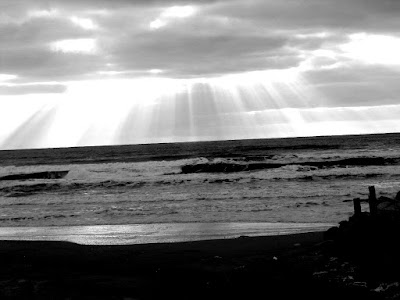Those of my readers who live poetry as I do, will need no explanation, Those words are only juxtaposed in Walt Whitman's masterpiece (at least in my opinion), SEA-DRIFT. The poem begins like this (it's very long, so I won't include the whole thing):
OUT of the cradle endlessly rocking,
Out of the mocking-bird's throat, the musical shuttle,
Out of the Ninth-month midnight,
Over the sterile sands and the fields beyond, where the child
leaving his bed wander'd alone, bareheaded, barefoot,
leaving his bed wander'd alone, bareheaded, barefoot,
Down from the shower'd halo,
Up from the mystic play of shadows twining and twisting as if
they were alive,
they were alive,
Out from the patches of briers and blackberries,
From the memories of the bird that chanted to me,
From your memories sad brother, from the fitful risings and fall-
ings I heard,
ings I heard,
From under that yellow half-moon late-risen and swollen as if with
tears,
tears,
From those beginning notes of yearning and love there in the mist,
From the thousand responses of my heart never to cease,
From the myriad thence-arous'd words,
From the word stronger and more delicious than any,
From such as now they start the scene revisiting,
As a flock, twittering, rising, or overhead passing,
Borne hither, ere all eludes me, hurriedly,
A man, yet by these tears a little boy again,
Throwing myself on the sand, confronting the waves,
I, chanter of pains and joys, uniter of here and hereafter,
Taking all hints to use them, but swiftly leaping beyond them,
A reminiscence sing.
Once Paumanok,
When the lilac-scent was in the air and Fifth-month grass was
growing,
growing,
Up this seashore in some briers,
Two feather'd guests from Alabama, two together,
And their nest, and four light-green eggs spotted with brown,
And every day the he-bird to and fro near at hand,
And every day the she-bird crouch'd on her nest, silent, with
bright eyes,
bright eyes,
And every day I, a curious boy, never too close, never disturbing
them,
them,
Cautiously peering, absorbing, translating.
Shine! shine! shine!
Pour down your warmth, great sun!
While we bask, we two together.
Two together!
Winds blow south, or winds blow north,
Day come white, or night come black,
Home, or rivers and mountains from home,
Singing all time, minding no time,
While we two keep together.
To anyone who loves poetry, this is absolutely thrilling. I am no more capable of writing such a thing than a dung beetle is capable of singing Gregorian chant. This poem, which is found in one of the later editions of Leaves of Grass, was written late in Whitman's life. [Sorry about the formatting, I don't know how to fix it and haven't time to try.] In the poem, he shares a nature experience from his childhood that gave rise to his poetry, and informed it for the rest of his life. This is the kind of thing that nature does.
Today, as I was walking back to our beach house from the road, having seen off some visitors, I was struck by the smell of the earth after this morning's rain. I knew instinctively that the smell of the moist earth was life, and that it gives life. I could say the same about the salt sea air, or the sun when it breaks through the clouds to warm us. These things are sacred. We must protect them, and save them for our children and for future generations. We are part of this life that has come "out of the cradle endlessly rocking," and we must act accordingly.






